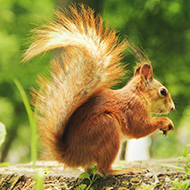Disease surveillance by veterinary scientists to help protect red squirrels

"By offering a disease surveillance service we can build up a picture of the current health threats to Scotland's red squirrels" - Professor Elspeth Milne.
Veterinary scientists at the University of Edinburgh's Royal School of Veterinary Studies (Dick Vet) are working with conservation and wildlife organisations to protect Scotland's red squirrel population.
The scientists are partnering with organisations to collect data on the health of red squirrels, and to monitor changes in diseases present in their population.
With only an estimated 140,000 red squirrels remaining in the UK, 75 per cent of these are in Scotland, meaning that the protection of this squirrels is essential to their survival.
Professor Elspeth Milne, veterinary pathologist at the Dick Vet, runs the disease surveillance programme for Scottish red squirrels, alongside her colleagues, which was established in 2005. She commented: “There is no doubt that squirrel pox virus is a serious threat to our native red squirrels in Scotland.
“However, there are a number of other health conditions, including leprosy, other viruses, and parasites that can also unfortunately result in their death, as well as the threat from road traffic.
“By offering a disease surveillance service we can build up a picture of the current health threats to Scotland’s red squirrels and identify disease incidence and patterns, which will help inform red squirrel conservation efforts.”
Squirrel pox virus, a virus which grey squirrels carry, but is lethal only to red squirrels, is a significant threat to red squirrels, and is being closely monitored by the group.
It has been discovered that squirrel pox virus is now causing red squirrel deaths in areas of Scotland which had not previously seen the disease, suggesting a spread of the virus.
Veterinary pathology resident Liam Wilson commented: “Historically, squirrel pox was mostly recognised as a significant threat to red squirrel populations in Dumfries and Galloway and the Scottish Borders.
“However, we are monitoring its spread closely and sharing our findings with conservation groups in Scotland so they can develop plans to stop the spread of this awful disease.”



 The Veterinary Medicines Directorate (VMD) is inviting applications from veterinary students to attend a one-week extramural studies (EMS) placement in July 2026.
The Veterinary Medicines Directorate (VMD) is inviting applications from veterinary students to attend a one-week extramural studies (EMS) placement in July 2026.